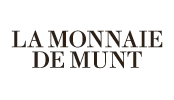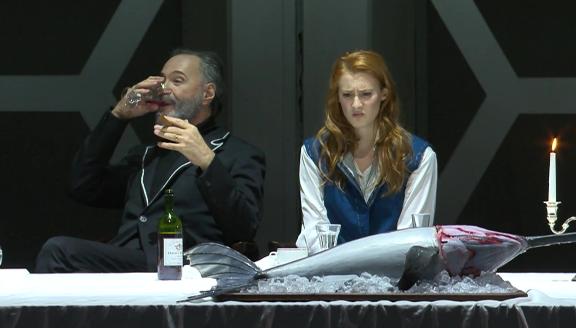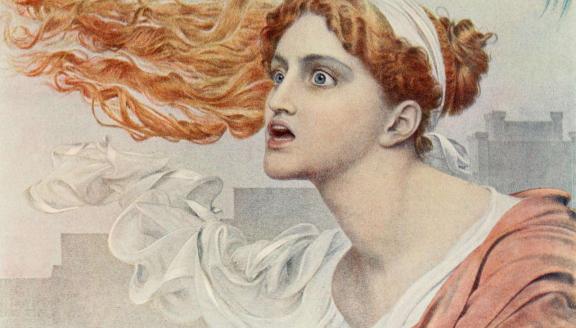Sandra divides her time between her research into the melting ice caps and stand-up comedy. Disturbed by the impact of human activity on the environment, she wants to use humour to raise awareness. But people around her, even her own family, are sceptical. Just as Cassandra predicted the fall of Troy without being heeded, Sandra predicts the imminent approach of a terrible tragedy but no one is listening.
After La Monnaie’s Henry VIII, a hitherto little-known operatic treasure by Camille Saint-Saëns, it is a world premiere of their new opera that we are lucky enough to discover live on OperaVision. Belgian composer Bernard Foccroulle, former director of La Monnaie and the Festival d'Aix-en-Provence, has chosen a highly topical theme for his first opera: ecological activism in the face of societal inertia. Cassandra's predictions may not have been heeded, but her story has been avidly read for over two thousand years. The Trojan prophetess has found her way into the collective consciousness through some of the greatest writers in literary history: Seneca, Homer, Aeschylus, William Shakespeare, Friedrich Schiller and Christa Wolf. Each shedding different light on her gift and its curse at the heart of Cassandra’s story, these varied sources have today inspired Matthew Jocelyn's libretto. Thanks to the powerfully evocative music conducted by Kazushi Ono, and sets that transport us in turn to an immense library, a beehive and the heart of a glacier, Cassandra promises to be a powerful and poetic new opera.
Cast
|
Cassandra
|
Katarina Bradić
|
|---|---|
|
Sandra
|
Jessica Niles
|
|
Hecuba / Victoria
|
Susan Bickley
|
|
Naomi
|
Sarah Defrise
|
|
Blake
|
Paul Appleby
|
|
Apollo / Angry Audience Member
|
Joshua Hopkins
|
|
Priam / Alexander
|
Gidon Saks
|
|
Stage Manager / Marjorie
|
Sandrine Mairesse
|
|
Conference Presenter
|
Lisa Willems
|
|
Orchestra
|
La Monnaie Symphony Orchestra
|
|
Chorus
|
La Monnaie Chorus
|
| ... | |
|
Music
|
Bernard Foccroulle
|
|---|---|
|
Text
|
Matthew Jocelyn
|
|
Conductor
|
Kazushi Ono
|
|
Director
|
Marie-Ève Signeyrole
|
|
Sets
|
Fabien Teigné
|
|
Costumes
|
Yashi
|
|
Lighting
|
Philippe Berthomé
|
|
Dramaturgy
|
Louis Geisler
|
|
Video
|
Marie-Ève Signeyrole
Artis Dzērve
|
|
Chorus master
|
Emmanuel Trenque
|
|
Film director
|
Myriam Hoyer
|
| ... | |
Videos
STORY
PROLOGUE – Somewhere out there
Human voices ring out from the void, like echoes from different times. They are directed at Cassandra and testify to her frenzy, her predictions and the curse put upon her. They see Troy burn, as foretold by Cassandra. It is then. It is now.
SCENE ONE – Troy burns, Cassandra watches
Cassandra has to watch while Troy burns. She cries out in despair. Perhaps this concerns not only the past, but also our future? “What has been, what is and what is to come.”
SCENE TWO – “Call me Cassandra”
Today. At a climate change conference, PhD student Sandra Seymour delivers a lecture in the form of stand-up comedy. She hopes this approach will move her listeners to action, something scientists have not managed to do with dry facts and figures. The audience applauds her, but afterwards, off-stage, an activist lashes out at her: who in their right mind would come up with the idea of joking about global warming? The activist in question is Blake, a student in Classics. Despite a false start, there is obvious chemistry between these two young people.
SCENE THREE – You spat in my mouth
The god Apollo endowed Cassandra with the gift of foretelling the future, but because she would not give herself to him, he spat in her mouth, so that nobody would ever believe her predictions again. Now Apollo makes fresh advances, but Cassandra resists him and refers to the various women he has seduced. He challenges her: does she really think she is the only person who can “see”? Does she really think she is unique? The future is there for the taking; anyone who really wants to, can see it. Cassandra experiences nothing but pain and sorrow.
SCENE FOUR – The bees (1)
A hundred bees swarm.
SCENE FIVE – Ototoi popoi da
A year has passed since Sandra and Blake first met and fell in love. They are now living together and both are working on their theses at home. Using algorithms, Sandra maps the melting ice caps on Antarctica and the consequent environmental changes. Blake is writing about Aeschylus’ Agamemnon, quoting words uttered by Cassandra in that play: “Ototoi popoi da” – seemingly incoherent words, which symbolise the indescribable horrors the prophetess sees before her. Despite their different areas of research, Sandra and Blake find plenty of common ground. As with Cassandra, Sandra’s views on the climate crisis go unheard: it is a “prophetic song, uninvited and unwelcome”. Their conversation is interrupted by the telephone: Sandra’s mother invites Sandra and Blake to her birthday party.
SCENE SIX – Family dinner
Victoria and Alexander are celebrating Victoria’s 55th birthday with their daughters Sandra and Naomi, and with Blake. The atmosphere is buoyant, banter flows and different ways of predicting the future are discussed. But Sandra is not at all pleased that her scientific work is being compared to crystal-gazing. The conversation turns to her parents’ visit to her in Antarctica and the alarming state of that continent. Alexander waves aside Sandra’s doom-mongering about the ice caps and points to the opportunities such as mining, which he believes will come with the melting of the polar ice… Sandra and Blake are shocked by what they hear and make ready to leave the party. But then the birthday cake is brought in. Once Victoria has blown out the candles, Naomi can finally share the news of her pregnancy.
SCENE SEVEN – In the library of the dead
Figures from the past wander around the library. King Priam is intent on rereading what history has written about him and the Fall of Troy. He also continues to blame Cassandra for the city’s destruction, while still failing to recognize that she was actually trying to warn him of the catastrophe. Hecuba speaks up for their daughter and gradually Priam realises that Cassandra’s words were the very antithesis of a curse. When Cassandra is left alone in the library, she has a vision. Of her death? Or someone else’s?
SCENE EIGHT – The call of motherhood
Sandra and Blake are at home. The atmosphere between them is affectionate but at times also uneasy: Blake is about to leave for Antarctica on a risky, eco-interventionist mission and he has told Sandra that he wants to have a child with her. She has mixed feelings about this: is it wise to bring children into this world? Blake is of the view that they are fighting hard for a better world – that of their children. Deep down, Sandra has to admit she does hear the call of motherhood, but she fears the “shipwreck” of this world.
SCENE NINE – The bees (2)
Fifteen bees buzz around.
SCENE TEN – Cradle song
Naomi sings a lullaby to her unborn baby: a girl she is going to call Alexandra.
SCENE ELEVEN – A ship on its way to Antarctica
Sandra has finished her thesis. She performs her comedy show one last time, but the tone is much more serious now and not everyone in the audience appreciates this. Insults are hurled at Sandra and some members of the audience leave the room. Sandra announces that she is done with the stage and academia and plans to become an activist like Blake, who is on his way to Antarctica. What she doesn’t know is that her parents and sister are also in the audience. While the show is still in progress, Sandra’s father receives the terrible news that the activists’ ship has gone down and there is no trace of Blake. On learning the news after the show, Sandra collapses. At the same moment, Naomi’s waters break; her child is coming. Sandra finds herself alone. Then Cassandra appears.
SCENE TWELVE – Nobody will ever take my voice away from me
It gradually begins to dawn on Sandra that she is in Cassandra’s presence and that their fates are intertwined. It is as if the grief-stricken Cassandra is trying to comfort Sandra – she recognizes only too well what the young woman is going through. Before she disappears, Cassandra presses home the message that no god can spit in Sandra’s mouth. No one can ever prevent her from being “heard”.
SCENE THIRTEEN – The bees (3)
Five bees buzz around, unaware of what is happening.
Marie Mergeay
Insights
Hear or disappear: Cassandra, a tragedy of listening
By Patrick Leterme
‘Ah, how fleeting and insignificant is human life!
As a fog suddenly appears, and just as suddenly disappears; so is our life, look!’
- J.-S. Bach, Ach wie flüchtig, ach wie nichtig, excerpt from Cantata BWV 26
(text adapted by Michael Franck)
‘Who wants to live in a world without Bach?’ In Cassandra (2020-2022), Bernard Foccroulle's first opera based on a libretto by Matthew Jocelyn, the question arises during a climate conference. The Bach Ice Shelf in Antarctica, which in 2009 was still thought not to be threatened by global warming, has since lost 120 of its 4,536 km2. The potential (and foreseeable) disappearance of the platform in a few decades' time is a metaphor for the melting away of the name Bach, the pinnacle of our entire cultural heritage. Bach, a name chosen in the 1960s by the UK Antarctic Place-Names Committee to shine like a beacon of human pride over the Weber, Boccherini and Stravinsky coves, as well as the Beethoven, Shostakovich and Monteverdi peninsulas, the Arensky and Glazunov glaciers, the Berlioz and Rossini points and the Gluck peak.
Antarctic place names, a sublime library of dead composers? Possibly. Because in Cassandra, given their closed-mindedness, the living will sometimes seem more dead than dead. In Cassandra, given the scope of their vision and their work, the dead will sometimes seem more alive than the living.
‘Ach wie flüchtig, ach wie nichtig’ quoted at the end of the opera, this Bach chorale, made up of a few words about the transience and vanity of human life, takes on a new meaning in the context of the libretto's ecological emergency: the text here seems to extend to the collective life of humanity, to ‘the human adventure’, as the philosopher Edgar Morin calls it. It's not the life of one human being, but human life as a whole, which, in the few billion years of the Earth's existence, could turn out to be very short indeed. In the ecological tragedy Cassandra, bees and blocks of ice are the symbols of a planet that is on the verge of being rendered humanly uninhabitable... by a species for which it is the matrix and the only possible home.
Herein lies one of the opera’s major dramaturgical and musical axes: the resonance of humanity's natural and cultural heritage, but also of the past and the present - this resonance allowing us to glimpse a future to choose from. Confronting the authors of the past with our immediate experience of the present gives rise to a new relief. It's a three-dimensional perspective, combining the critical distance of a long time with the capacity for direct action of the present.
In his opera The Rake's Progress, Stravinsky brought together for the first time two non-consecutive eras: that of Mozart's classicism (the end of the 18th century) and his own (the middle of the 20th century). This surprising musical recipe was the very essence of his entire neo-classical period. Bernard Foccroulle, driven by this conviction of the richness of a dialogue between the centuries (for musical and cultural, even philosophical reasons, before drawing the strictly aesthetic consequences), has already practised even wider splits: in E vidi quattro stelle (2020) for soprano, baritone and ensemble, Dante's fourteenth century seems to be reaching out to the twenty-first... while brushing up against Monteverdi's seventeenth-century dawn in the process.
Cassandra goes even further, building a bridge 26 centuries long between the ancient Greece of Aeschylus and our globalised world! This duality is present in the very professions of the two main characters: Blake is an expert in classical languages and literature; Sandra is a climatologist.
The mythological scenes, with their energy disconnected from our contemporary daily lives, are composed in a broad time frame. The brass instruments (as in E vidi quattro stelle, quoted above) resonate in a calm, Monteverdi-like buoyancy. When Priam makes his entrance (Scene VII - In the Library of the Dead), the tam-tam and gongs further amplify the solemnity of the music in a splendid scene that, by playing with the laws of physics and superimposing moments that never coexist in our reality, reveals all its dramatic depth. Behind the solo voices of the divinities, the harp leaves a few notes, a sober accompaniment such as the first harps and lyres practised in Antiquity (Scene III - You spat in my mouth). When the destruction of Troy is evoked, the percussion becomes wild and Dionysian (Scène I - Troie brûle, Cassandre regarde).
The contemporary scenes are written in a much more 'real' time, lively and concrete. The marimba suggests Sandra's sparkling dynamism; the alto saxophone snakes between the voices for the first time when love itself slips between Blake and Sandra.
As for the chorus, it fully recaptures its title of ‘Greek chorus’, both literally and figuratively... An interface between the action and the audience, it observes and comments. It is the interface between the action and the audience, observing and commenting. Unmaterialised, it is emotionally involved without (being able to) actively intervene in the scenes, and becomes a kind of spiritual and collective entity. Is this choir the mass of humanity (the all-too-blind and silent majority who 'could' hear if they really 'wanted to')? Is it the fluid of the collective human adventure, the life energy that flows through it and does not belong to it? Is it the spiritual dimension that humanity currently lacks in its relationship with the environment? Is it the critical eye that will awaken us from our torpor? Probably a bit of both…
Rocks, bees and Climate Action Group: English was the obvious choice for librettist Matthew Jocelyn and Bernard Foccroulle. Because it is the former's mother tongue, but also because English is rhythmic and concise, with a rich and varied sawtooth intonation, and because it is the natural language of activists, facing the biggest challenge of a globalised world.
Bernard Foccroulle's orchestration is delicate, mostly light, and always attentive to the text. In this service to the theatre, there is the expertise of a former director of institutions whose keen ear has been confronted with the very crucial questions of balance between singers and orchestra that can arise in certain works, including some of the great masterpieces of the world operatic repertoire.
The tragedy of our times is that predictable drama does not seem to be pre-audible. Matthew Jocelyn and Bernard Foccroulle did not set out to make Cassandra a debate of ideas (which would have had no need of the operatic genre) or a militant work. But in its dramatic anchoring, in the love of nature and culture that it betrays, their opera makes a vibrant appeal to preserve our two most precious heritages.
Could Bernard Foccroulle live in a world without Bach? We doubt it. But in keeping with his musical philosophy, which tirelessly surveys geographical space (the music of the different peoples of the world) and temporal space (the centuries of the musical repertoire), and in love with the finest legacies of our civilisation, he asks the question not of himself, but of the eras and generations that precede, surround and follow him.
And, paraphrasing the text of Bach's chorale, he seems to be saying: ‘This is our life... listen!’



